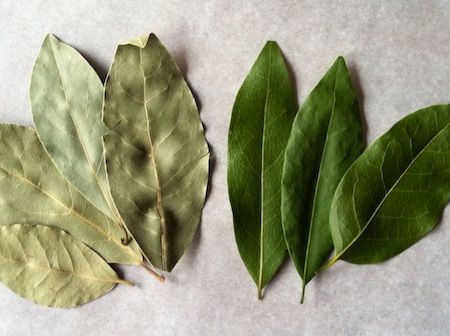Bay leaves have a woody, floral, and slightly bitter aroma. Bay leaves give off a distinct fragrance characterized by notes of woodiness, floral undertones, and a hint of bitterness.
Widely used in cooking, bay leaves add a unique flavor and aroma to soups, stews, and sauces. These leaves are often used dried, as they become more fragrant and flavorful over time. When crushed or steeped in hot liquid, bay leaves release their essential oils, intensifying their scent and taste.
The smell of bay leaves can be described as earthy, reminiscent of pine and herbs, with a subtle sweetness. Due to their pungent aroma, it is important to use bay leaves sparingly to avoid overwhelming dishes with their fragrance.
The Aroma Of Bay Leaves
Bay leaves have a distinctive scent that is sweet and herbal. When crushed or dried, they release an aromatic combination of flavours and fragrances. The scent of bay leaves is often described as earthy with hints of floral and eucalyptus. It is strong but not overpowering, making it a popular choice for adding flavour to various dishes.
The aroma of bay leaves is most pronounced when they are used in slow-cooked meals or simmered in soups and stews. Due to their aromatic properties, bay leaves are also commonly used in potpourri and essential oils. Overall, bay leaves offer a sensory experience that is both pleasing to the nose and enhancing to the taste.
Understanding The Fragrance Profile
Bay leaves are known for their unique fragrance profile, offering a complex blend of flavours and scents. With woody undertones and hints of cloves, the aroma of bay leaves is both earthy and slightly bitter. These leaves are commonly used in cooking to enhance the flavours of soups, stews, and sauces, infusing dishes with their distinct aroma.
Factors Influencing The Smell
Bay leaves are known for their distinctive aroma, which can be described as herbal and slightly floral. The smell of bay leaves is influenced by several factors.
1. Growing conditions of the bay tree: The environment in which the bay tree is grown plays a significant role in determining the scent of the leaves. Factors such as soil composition, sunlight exposure, and humidity levels can all impact the aroma.
2. Varieties of bay leaves and their scent: Different varieties of bay leaves, such as Turkish bay leaves and California bay leaves, have their own unique scents. Turkish bay leaves tend to have a milder aroma, while California bay leaves are more pungent.
3. Harvesting and storing methods: The way bay leaves are harvested and stored can also affect their smell. Leaves that are harvested at the right time and properly dried and stored will retain their aroma better.
Common Descriptions Of Bay Leaf Smell
Bay leaves have a unique and distinct aroma that is often described as a combination of several scents. Comparable to eucalyptus and menthol, bay leaves emit a refreshing and cooling fragrance. They also share similarities with cinnamon, offering a hint of warmth and a touch of pine.
Additionally, bay leaves are reminiscent of camphor and thyme, giving off a slightly medicinal and herbal scent. These common descriptions highlight the complex and versatile nature of bay leaf smell, making it an essential ingredient in various culinary dishes and aromatherapy practices.
Usage And Applications Of The Aromatic Herb
Bay leaves are known for their distinct and pleasant aroma, which can be described as a combination of floral, herbal, and slightly sweet notes. This aromatic herb is widely used in various cuisines as it adds depth and complexity to soups, stews, and sauces.
When the leaves are added to hot liquids, the essential oils are released, infusing the dish with their fragrance. Apart from its culinary uses, bay leaves also have aromatherapy benefits. The essential oil extracted from these leaves is commonly used in diffusers to create a calming and soothing environment. Additionally, bay leaves have been used in traditional remedies for their medicinal properties.
They are believed to have anti-inflammatory, antioxidant, and antifungal properties. However, it’s important to note that bay leaves should be used in moderation as their flavour can be overpowering if used excessively.
:max_bytes(150000):strip_icc()/ALR-what-is-a-bay-leaf-002075a20ae444ceb0266c2fc2129e55.jpg)
Credit: www.allrecipes.com
Tips To Enhance The Aroma Of Bay Leaves
Bay leaves are known for their distinct and aromatic smell that adds a unique flavour to dishes. Fresh and dried bay leaves have different characteristics when it comes to aroma. Fresh bay leaves have a more subtle and delicate scent, while dried leaves are more intense and concentrated in flavour.
To enhance the aroma of bay leaves in your recipes, there are a few tips you can follow. Bruising or warming the leaves before use can help release their oils and intensify the fragrance. This can be done by lightly crushing the leaves or heating them in a pan.
Another way to enhance the aroma is by pairing bay leaves with complementary spices and herbs. Bay leaves go well with flavours like thyme, oregano, and rosemary. Combining these ingredients can create a more complex and aromatic taste in your dishes.
Frequently Asked Questions
How Do You Describe The Smell Of A Bay Leaf?
The bay leaf has a distinct aroma that is pungent, herbal, and slightly earthy in nature.
What Is The Smell Of Bay?
Bay has a unique and pleasant scent that is herbal, spicy, and somewhat reminiscent of cloves.
Do Bay Leaves Smell Like Eucalyptus?
No, bay leaves do not smell like eucalyptus.
Do Bay Leaves Really Make A Difference In Cooking?
Yes, bay leaves do make a difference in cooking as they add a unique flavour to dishes.
Conclusion
The aroma of bay leaves is indeed unique and distinctive. It has a combination of herbal, floral, and slightly spicy notes that add depth and complexity to various dishes. Whether you’re using it in soups, stews, sauces, or even teas, bay leaves contribute a delightful scent that enhances the overall taste experience.
Their intense fragrance adds a touch of warmth and earthiness, enticing our senses and making our mouths water. The beauty of bay leaves lies in their ability to complement a wide range of flavours without overpowering them. They are a staple in many cuisines around the world, and once you experience their delightful aroma, you’ll understand why.
So the next time you come across a recipe that calls for bay leaves, don’t hesitate to include them – your taste buds will thank you!








